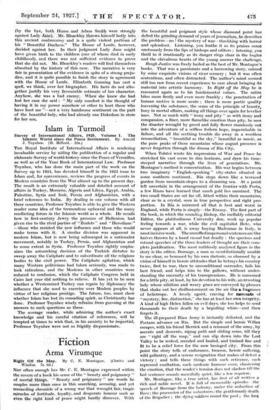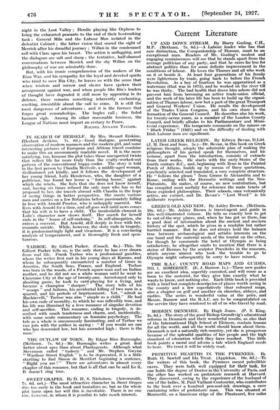iction
Arena Virumque
NOT often enough has Mr. C. E. Montague expressed within
the covers of a book his sense of the " beauty and poignancy " of mortal thing. ":'Beauty and poignancy " are words he couples more than once in this searching, accusing, and yet reconciling chronicle of a wrong war that wrought fair, tragic miracles of fortitude, loyalty, and desperate honour such as even the right kind of peace might hardly discover. With the beautiful and poignant style - whose diamond point has defiedthe grinding demand of years of journalism,he describes the problem—no ! the mystery of war—throbbing with horror and splendour. Listening, you loathe it as its praises come unctuously from the lips of bishops and editors ; listening, you thrill to it irrationally as its danger rings clear in the bugles and the chivalrous hearts of the young answer the challenge.
Rough Justice was freely hailed as the best of Mr. Montague's books. That was a passionate and a harrowing story, calmed by some exmiisite visions of river scenery ; but it was often sententious, and often distracted. The -author's mind seemed still too raw from recent experience to care about bringing its material into artistic harmony. In Right of the Map he is reassured again as to his fundaMental values. The satire bites more fierily and even more frankly ; the penetration of human motive is more acute ; there is more poetic quality leavening the substance, the sense of the principle of beauty, busy in mortal affairs, making all things over again for lovelier uses. Not so ranch with " irony and pity " as with irony and COmpassiOn, a finer, more flamelike emotion than pity, he sees the disaster wrought by greed and folly flower stainlessly out into the adventure of a selfless forlorn hope, imperishable in failure, and all the seething trouble die away in a wordless reconciliation, " beautiful as the sky," beautiful as music, as the pure peaks of those mountains whose august presence is never forgotten through the drama of Ria City.
When Tolstoi wrote his impressions of War and Peace he stretched his vast scene to dim horizons, and dretv his time- steeped narrative through the lives of generations. Mr. Montague's method is concentration. His war begins between two imaginary " English-speaking " city-states situated in some southern continent. Ria steps down like a terraced garden from mountain-slopes to a dreaming sea. At a point left uncertain in the arrangement of the frontier with Porta, a few Rians have learned that much gold lies unmined. The two small States are set far off, fitted within their mountains, clear as in a crystal, seen in true perspective and right pro- portion. In Ria is mirrored all that is best and worst in England, while Porta is simply—the Enemy. The first part of the book, in which the sounding Bishop, the ineffably editorial Editor, the platitudinous University don, work up popular feeling towards a war, while the evil capitalist Bute, who never appears at all, is away buying Madonnas in Italy, is most incisive work. The unruffled impersonal sentences are like knives thrown by a hand casual but deadly : the specious and rotund speeches of the three leaders of thought are their com- plete justification. The most ruthlessly analysed figure in the story is the editor, Burnage, a man so constitutionally unable to see, clear,-so so bemused by his own rhetoric, so obsessed by a vision of himself in heroic attitudes that he betrays his country twice, first to war, then to Unconditional surrender, fails his best friend, and helps him to the gallows, without under- standing the enormity, of his transgressions. He is ransomed for a little pity, at least, by his devotion to his wife, an arresting lady whose nihilism and weary grace are conveyed by phrases that shake out her disillusionment on the air like a fragrance of heliotrope. A lovely egoiit, craving for moments of " mystery, fire, distinction," she has at least her own integrity. A kind of high Helen fallen on evil days; she too helps to send thousands to their death by a beguiling whim--and then forgets it.
The ill-prepared Rian Army is instantly defeated, and the Portans advance on Ria. But the simple and heroic Willan escapes, with his friend Merrick and a remnant of the army, by ascents and descents, zigzag path and sliding scree, till they are " right off the map," and can slip down into the Lost Valley to be reshod, mended and healed, and trained fine and fit to be a relief force for the now besieged city. From this point the story tells of endurance, treason, heroic suffering, wild gallantry, and a serene resignation that makes of defeat a victory ; and tells these things with such reticence, such repressed exultation, such sardonic humour even, chastening the emotion, that the reader's tension does not slacken till the last sentence sounds mercifully quiet, like a low requiem.
Mr,,Montague, like a true artist, has first of all written a rich and noble novel. lit, is full of memorable episodes—the speech of Burnage from the balcony, under the seduction
death of Rose; the procession of the volunteers ; the gentlemanly of the Brigadier ; the dying soldiers round the pool ; the first night in the Lost Valley ; Hendie playing like Orpheus to bring the exhausted peasants to the end of their bootmaking task ; General Man and the Labour Man isolated in the defeatist Cabinet ; the bitter vision that seared the sight of Merrick after his dreadful journey ; Willan in the condemned cell with Clare upon his breast. The action is unflagging, and the dialogues are salt and sharp ; the tentative, half-shamed conversations between Merrick and the shy Willan on the philosophy of war are admirably done.
But, with his ironic comprehension of the makers of the Rian War, and his sympathy for the loyal and devoted spirits who tried to save Ria City, he leaves us with the sense that when wisdom and sorrow and shame have spoken their arraignment against war, and when people like Ria's leaders of thought have degraded it still more by appearing in its defence, there remains something inherently enchanting, exciting, irresistible about the call to arms. It is still the most dangerous of adventures ; and it is the furnace that forges great comradeships. The bugles call ; the faded banners sigh. Among its other reasonable business, the League of Nations must impart an ecstacy to Peace.
RACHEL ANNAND TAYLOR.











































 Previous page
Previous page